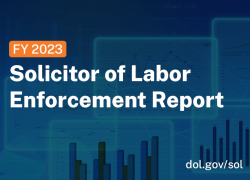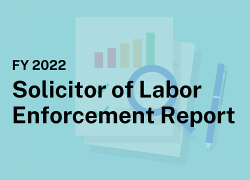
All workers deserve good jobs and laws that protect them while on the job. But many employers require employees to sign contracts that restrict their ability to pursue their labor law rights. These coercive contracts can violate the laws enforced by the U.S. Department of Labor.
Here in the Office of the Solicitor, we too often see employment contracts that contain provisions that claim to waive workers’ rights or discourage workers from exercising their rights. They often succeed in scaring workers from attempting to pursue their rights, particularly when they attempt to make them liable for exponentially more money than they ever earned from their employer. As outlined in our new Special Enforcement Report, the Solicitor’s Office is committed to combating unlawful and coercive “fine print” provisions to ensure that every worker receives the protections that federal law guarantees.
That’s why we filed a complaint on Sept. 20 against a transportation logistics company called Cargomatic Inc. related to its coercive “fine print” provisions. The complaint alleges that after current and former drivers sued the company for pay violations under the Fair Labor Standards Act (FLSA), the company sent letters to certain drivers involved in the suit asserting that they had signed contracts that required them to pay the company for the cost of defending the suit. This attempt to pass along costs to workers for an employer’s unlawful conduct violates the law. On Sept. 25, the court granted our request for a permanent injunction against Cargomatic Inc. to stop the company from engaging in intimidation and threats against drivers who pursue their FLSA rights, and to stop them from enforcing or attempting to enforce any indemnity-type provision requiring drivers to pay the company’s legal costs.
We are also taking action regarding other troubling “fine print” provisions that can chill workers in exercising their rights, and that may violate the law, including:
- Contract provisions that try to require employees to agree that they are independent contractors.
- Provisions trying to shift employer liability for legal violations to workers or other entities (e.g., by requiring employees to pay the employer for damages that the employer is ordered to pay because it misclassified employees).
- “Loser pays” provisions attempting to require employees to pay the employer’s attorney’s fees and costs if the employees do not succeed in litigation or arbitration.
- “Stay or pay” provisions, including some training repayment assistance provisions, that try to require workers to pay damages to their employer for leaving a contract early.
- Company policies that require workers to report safety concerns to their employer before contacting any government agencies.
- Confidentiality, non-disclosure, and non-disparagement provisions.
- Other contract provisions that require employees to waive their legal rights.
Ultimately, workers should not be required to pay their employers huge sums simply because they left their jobs for safer ones, sought to report violations to the government or sought to exercise their rights under the law in some other way.
Workers always have a right to report unlawful conduct to the department and to cooperate in our investigations and litigation, regardless of whether they have signed private contracts or mandatory arbitration agreements. As the Special Enforcement Report makes clear, the department and my office will continue to vigorously advocate on behalf of workers to combat coercive “fine print” provisions.
Seema Nanda is the solicitor of labor.

 U.S. Department of Labor Blog
U.S. Department of Labor Blog




